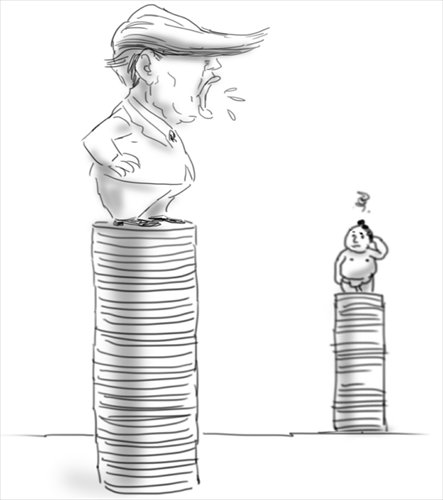A Trump presidency could see US-Japan relations become looser

Illustration: Liu Rui/GT
Though the US general election is still several months away, the Republican presidential candidate Donald Trump's high popularity among voters has touched a nerve of Japanese media outlets.
Looking back at US presidential elections since 2000, it is easy to see that candidates tend to exaggerate the "China threat" theory and denounce Beijing for protectionist trade policies.
However, Trump has not only repeatedly mentioned China by name but also frequently condemned the US' traditional ally Japan, to the surprise of many.
It should be noted that even in the 1980s when Tokyo was compelled to sign the Plaza Accord given the intensified trade conflicts between the two nations, then US president Ronald Reagan and his Japanese counterpart Yasuhiro Nakasone boasted a close relationship, popularly known as the "Ron-Yasu" friendship. And then Japanese prime minister Junichiro Koizumi's visit to North Korea in 2002 without informing the White House did not have much of a negative influence on his relations with then US president George W. Bush.
Therefore, Trump's accusations against Japan on many occasions have been worrying Japanese media now that no protruding frictions and disputes exist between the two allies.
Nonetheless, Trump's attacks on Tokyo are traceable. Born in 1946 after the end of WWII, Trump grew up in an era when Japan enjoyed unprecedentedly fast economic growth that many guessed would likely surpass that of the US. Therefore, he developed rather a deep and thorough cognition of Japan as a young man. For instance, in 1987, he spent tens of thousands of dollars on ad space in The New York Times, The Washington Post and The Boston Globe to denounce Japan.
Of course, he is outspoken and keeps making gaffes mainly because he participates in the general election at his own expense. Presidential candidates used to raise funds from the public, large-scale corporations and consortia. The subsequent complicated entanglement of interests hamstrings the candidates when they deliver speeches. Without having to give due regard to the interests of fundraisers, Trump dares to roundly flay Japan and its enterprises in the US.
How the Japanese political circle and its financial communities will judge the comments Trump has made on Japan remains unknown. But what he said has caused a stir in the country's press, at least.
Yomiuri Shimbun states, "For Japan, Trump-mania cannot be simply overlooked," in its March 17 editorial titled "Incendiary language by a presidential candidate invites divisiveness in US." On the same day, Mainichi Shimbun also mentioned in its editorial that "If Trump is to become US president, it could cause Japan-US friction."
Why are Japanese media outlets so worried about Trump becoming the next US president? Perhaps they are afraid that the Treaty of Mutual Cooperation and Security between the US and Japan may be fundamentally changed because of Trump.
Recently, Trump pointed out that US troops stationed in Japan have brought no benefit to the US and therefore Tokyo should bear all the costs of keeping them there. Currently, the Abe administration keeps interfering in the South China Sea issue in a high-profile way and making trouble on the sovereignty of the Diaoyu Islands, which is mainly attributed to the backup the treaty provides. If Trump is elected, the decades-long treaty will definitely change. Without Washington's support, Tokyo will be unable to continue intervening in the South China Sea and sustain its influence upon the Asia-Pacific region.
Meanwhile, if the security treaty changes, Japanese Prime Minister Shinzo Abe will have more reasons to revise the pacifist constitution. In this way, the postwar international order will be changed and Japan will be able to participate in warfare, which undoubtedly perturbs the Japanese media.
From a long-term perspective, the Japanese press is concerned more about the future of Japan-US ties and the former's position in the latter's foreign policies. Since Barack Obama assumed office in 2009, the decline of the US and the rise of China have gained momentum and Beijing-Washington relations have become the priority on the White House's diplomatic agenda.
Though Trump has been repeatedly naming and criticizing China, it is not hard to see that stable bilateral ties between the two nations agree more with the US' national interests given its China policies formulated during the Bush and Obama administrations.
It is hence predictable that if Trump is elected president, he will choose to cooperate with China, from which Japan will fail to benefit.
The author is a PhD candidate at the Graduate School of Sociology at Toyo University. opinion@globaltimes.com.cn Follow us on Twitter @GTopinion